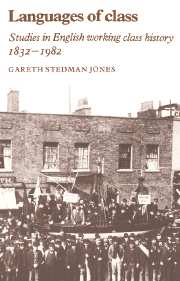Book contents
- Frontmatter
- Contents
- Acknowledgements
- Introduction
- 1 Class struggle and the Industrial Revolution
- 2 Class expression versus social control? A critique of recent trends in the social history of ‘leisure’
- 3 Rethinking Chartism
- 4 Working-class culture and working-class politics in London, 1870–1900: Notes on the remaking of a working class
- 5 Why is the Labour Party in a mess?
- Index
4 - Working-class culture and working-class politics in London, 1870–1900: Notes on the remaking of a working class
Published online by Cambridge University Press: 08 January 2010
- Frontmatter
- Contents
- Acknowledgements
- Introduction
- 1 Class struggle and the Industrial Revolution
- 2 Class expression versus social control? A critique of recent trends in the social history of ‘leisure’
- 3 Rethinking Chartism
- 4 Working-class culture and working-class politics in London, 1870–1900: Notes on the remaking of a working class
- 5 Why is the Labour Party in a mess?
- Index
Summary
In the London of the 1880s, Charles Masterman recalled, the future that all had foretold had been one of class war and the formation of a workers' party. But that future had not materialized. For, ‘a wave of imperialism has swept over the country, and all these efforts, hopes and visions have vanished as if wiped out by a sponge’. Masterman was writing in 1900, the year of the Mafeking celebrations. No one who saw the crowds on Mafeking night ever forgot them. ‘Mafficking’ entered the English language, and the memory was still vivid in the 1920s and 1930s when a growing literature of reminiscence comforted the dispirited inhabitants of servantless houses with the legend of a departed golden age. ‘In those days’, asserted one former stockbroker, ‘East met West. And yet each “knew his place”, the boast of the time … You would see bevies of’ Arrys and ‘Arriets in these national demonstrations burst out from the congestion of the pavements to jig themselves into forgetfulness of the sterner realities of Bermondsey and Bethnal Green as they “set” to one another in a saturnalia of howl and mouth organ.’ The strangeness of the occasion was strikingly recaptured by Thomas Burke, forty years afterwards: ‘I was out at Armistice Night, but I don't recall that publicans went right off their heads and refused all day to take money from anybody. I don't remember any young men screwing up five-pounds notes and tossing them into the air for catch-who-can. I don't remember money-grubbing City men going so mad as to shower sovereigns and handfuls of silver among the crowd. I don't remember seeing men take off their hats and jump on them.’
Information
- Type
- Chapter
- Information
- Languages of ClassStudies in English Working Class History 1832–1982, pp. 179 - 238Publisher: Cambridge University PressPrint publication year: 1984
